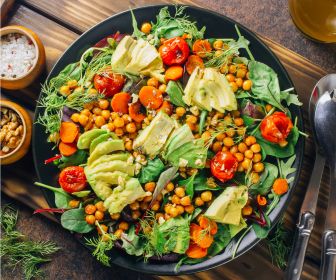
Quinoa & Avocado Chickpea Salad
Share
A hearty, hormone-friendly lunch that fuels focus and calm energy
Need something light yet filling to power you through the afternoon?
This Quinoa & Avocado Chickpea Salad is your go-to bowl — full of plant protein, fibre, and healthy fats that support steady energy and hormone balance.
It’s quick to make, refreshing to eat, and perfect for perimenopause and menopause. Pair it with a chilled Raspberry & Pomegranate Umri for a fruity antioxidant lift that keeps you balanced and hydrated.
Ingredients (Serves ~2)
- ½ cup cooked quinoa
- 1 cup chickpeas (cooked or canned, rinsed)
- ½ avocado, diced
- Handful of cherry tomatoes, halved
- ½ cucumber, diced
- 2 tbsp olive oil
- 1 tbsp lemon juice
- Fresh parsley, chopped
- Salt & pepper to taste
- Optional: pumpkin seeds or a sprinkle of feta
Instructions
Step 1 – Cook the Quinoa
Rinse ½ cup quinoa under cold water using a fine-mesh sieve to remove bitterness.
Combine with 1 cup water in a saucepan, bring to a boil, then simmer for 15 min.
Remove from heat, cover 5 min, fluff with a fork, and let cool.
Step 2 – Prep the Veggies & Chickpeas
Dice avocado into cubes.
Drain and rinse chickpeas well.
Halve cherry tomatoes and dice cucumber for a crisp bite.
Step 3 – Whisk the Dressing
In a small bowl, whisk together olive oil, lemon juice, salt, and pepper.
Add a pinch of cumin or paprika if you love a subtle spice.
Step 4 – Assemble the Salad
Combine quinoa, chickpeas, avocado, tomatoes, and cucumber in a large bowl.
Drizzle the dressing and toss gently — keep those avocado cubes intact.
Top with chopped parsley.
Step 5 – Serve and Enjoy
Adjust seasoning, add feta or pumpkin seeds if desired, and serve immediately.
Perfect warm or chilled for lunch prep.
Why This Salad Supports Menopausal Health
- Balanced macros: Quinoa and chickpeas provide complete plant protein + fibre for stable blood sugar.
- Healthy fats: Avocado and olive oil nourish hormones and support glowing skin.
- Digestive support: Fibre and plant enzymes help reduce bloating.
- Heart and bone support: Magnesium, potassium, and calcium (from feta or seeds) maintain bone density and heart rhythm.
- Hydration boost: Cucumber and tomato provide water + electrolytes to help with hot flashes.
For ingredient sourcing and nutritional transparency, explore the Umri Ingredients Detail Page — where we break down the benefits of each botanical and mineral we use.
Quick Nutrition Snapshot (per serving approx.)
| Nutrient | Amount | Benefit |
|---|---|---|
| Calories | 400–450 kcal | Steady energy |
| Protein | 14–16 g | Supports lean muscle |
| Fibre | 10 g | Promotes digestion & satiety |
| Healthy fats | 18–20 g | Hormone & skin support |
| Magnesium & Iron | — | Combat fatigue |
Tips & Variations
- Make it Mediterranean: Add olives, roasted peppers, or a sprinkle of za’atar.
- Boost protein: Toss in edamame or tofu cubes.
- Add crunch: Try sunflower seeds instead of pumpkin seeds.
- Batch prep: Keeps well for 2–3 days in the fridge — ideal for work lunches.
- Add a refreshing pairing: Enjoy with Umri Passionfruit & Peach for a stress-supporting combo of adaptogens and electrolytes.
Science Corner
For readers curious about heart-healthy fats, the American Heart Association highlights how monounsaturated fats from olive oil and avocado support cardiovascular health.
FAQs — Umri & Everyday Lunch Energy
Q1: Can I prep this salad ahead for lunch boxes?
Absolutely. Store dressing separately and combine right before eating to keep the avocado fresh.
Q2: Can I enjoy this with an Umri drink?
Yes! Pairing it with Raspberry & Pomegranate Umri® adds antioxidants and adaptogenic balance to support afternoon focus.
Q3: Is quinoa gluten-free?
Yes, quinoa is naturally gluten-free — ideal for those avoiding wheat.
Q4: Can I replace chickpeas?
You can swap with lentils or black beans for variety and a different texture.
Q5: Why is this great for perimenopause?
It balances blood sugar, supports hormonal stability with healthy fats, and delivers key minerals (magnesium, potassium, zinc) that your body craves during hormonal transitions.
